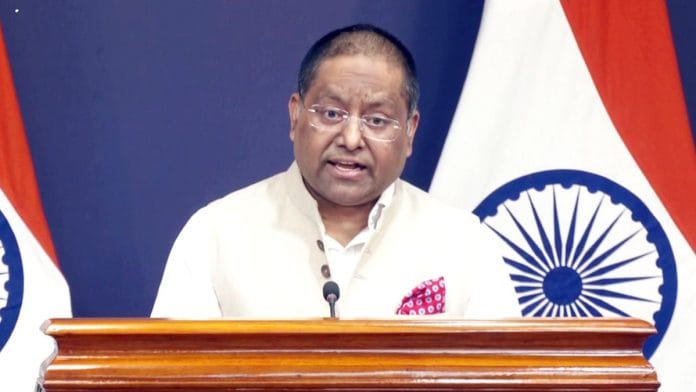New Delhi: India remains focused on the “substantive agenda” of its ties with the US, with a 2+2 inter-sessional meeting at the working level expected to be held at the end of month, said Randhir Jaiswal, spokesperson for the Ministry of External Affairs (MEA) Thursday.
“This robust cooperation has strengthened across all domains. We are expecting a U.S. Defence Policy Team to be in Delhi in mid-August. The 21st edition of the joint military exercise—Yudh Abhyas—is also expected to take place later this month in Alaska. Both sides remain engaged to convene the 2+2 Intersessional meeting at the working-level towards the end of the month,” Jaiswal said at a regular press briefing.
The spokesperson added: “India and the United States share a comprehensive global strategic partnership anchored in shared interests, democratic values, and robust people-to-people ties. This partnership has weathered several transitions and challenges.”
India’s defence partnership with the US has expanded in recent years, with a number of deals in the pipeline. Last month three Apache helicopters were received by India, with discussions over the procurement of P-8i maritime surveillance aircraft ongoing.
Questions have been raised over the ongoing India-US strategic partnership, due to ties hitting a rough patch in recent weeks. However, Jaiswal categorically said that defence ties between the two countries are “underpinned by foundational defence agreements” and are an “important pillar” of the bilateral partnership.
Trump has been pushing India to procure more American defence platforms, with his administration publicly calling for New Delhi to reduce its strategic reliance on Russia. External Affairs Minister S. Jaishankar is set to travel to Moscow later this month for the next round of inter-governmental discussions.
American President Donald J. Trump imposed an additional tariff of 25 percent on India on 6 August, citing New Delhi’s ‘continued purchase of Russian oil’.
India in the previous financial year imported roughly $56 billion worth of crude from Moscow, becoming the second largest buyer of Russian oil.
Trump’s ire at India came after negotiations for a mini-trade deal between the two countries have stalled, especially over the demand for New Delhi to open its agricultural and dairy sectors. The latest tariffs imposed by Trump are imposed above a baseline 25 percent tariff that came into force on 7 August.
The spokesperson added: “We remain focused on the substantive agenda that our two countries have committed to and we hope that the relationship will continue to move forward based on mutual respect and shared interests.”
Trump had welcomed Pakistan’s army chief, Field Marshal Asim Munir, to the White House for lunch in June. Munir travelled to Florida last week for a retirement function of General Michael Kurilla, the outgoing commander of US Central Command (CENTCOM).
The recent revival of US-Pakistan ties has raised serious questions over New Delhi’s strategic relationship with Washington D.C.
Furthermore, Islamabad has nominated Trump for the Nobel Peace Prize, for his self-stated role in the pause of hostilities between India and Pakistan earlier this year. New Delhi has maintained that the cessation of military hostilities at the end of the 87-hour ‘war’ that followed the launch of Operation Sindoor by Indian armed forces was arrived at due to bilateral discussions between Indian and Pakistani military officials. However, Trump has consistently claimed credit for the agreement.
(Edited by Amrtansh Arora)






